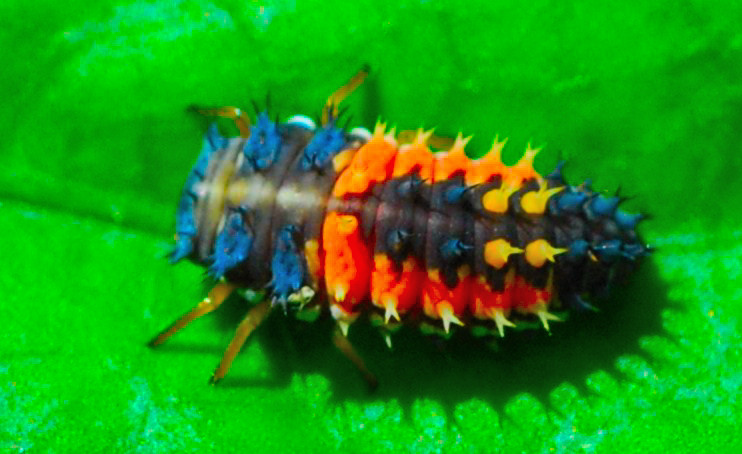WILDLIFE PHOTOGRAPHY – MY BACKYARD
This photograph is of a Ladybug in its larval stage of development. The photo was taken with a Nikon D80 and a Nikkor 60mm lens in my backyard. I found it so strange that this critter becomes a Ladybug when it matures, but, such is the life of this insect!
- Ladybug Trivia:
They are small insects, ranging from 1 mm to 10 mm (0.04 to 0.4 inches), and are commonly yellow, orange, or scarlet with small black spots on their wing covers, with black legs, head and antennae. A very large number of species are mostly or entirely black, grey, or brown and may be difficult for non-entomologists to recognize as coccinellids (and, conversely, there are many small beetles that are easily mistaken as such, like tortoise beetles).
Predatory ladybugs are usually found on plants where aphids or scale insects are, and they lay their eggs near their prey, to increase the likelihood the larvae will find the prey easily. Ladybugs are cosmopolitan in distribution, as are their prey.
Ladybugs also require a source of pollen for food and are attracted to specific types of plants. The most popular ones are any type of mustard plant, as well as other early blooming nectar and pollen sources, like buckwheat, cilantro, red or crimson clover, and legumes like vetches. Also, early aphid sources, like bronze fennel, dill, cilantro, caraway, angelica, tansy, yarrow, of the wild carrot family, Apiaceae. Other plants that also attract ladybugs include coreopsis, cosmos (especially the white ones), dandelions, and scented geraniums.

I’m very impressed with your photos.
This is a pic I've never seen! Fantastic!
Thanx Charles, it was taken in my backyard and I had someone identify it for me.
Love it! Prettiest grub I’ve ever seen.
Thank you, I was so surprised that it turns into a ladybug!
Very cool photo Alan.
I’m following you on twitter. One thing I noticed is that you have put in lot of efforts in these pictures but haven’t put those efforts on twitter. Please describe about the links on twitter so that it’ll reach out to more people. Good work.
I agree with your comment 100%. I have been concentrating on building the website and taking new photos! Promoting it, the right way on Twitter, will follow!
Stunning photography
Just amazing! One of my favorite bugs are in fact the Lady bugs along with Grasshoppers, and the Tortoise Beetle. I love Tortoises and the Beatles in fact! LOL! I love the Turtles as well. I am getting to accept spiders around me too. Never thought that would ever happen. I really dig dragonflies too. Have a great day….
I\’m totally jealous of your work!
Isnt that colorful!! Great catch!
Hard to believe that it turns in to a ladybug!
Keep up the great work Alan
Wow! that’s interesting! Would it be considered a kind of caterpillar?
Not a caterpillar, but it does go through major metamorphosis
Did you go to school for this???
Never thought that would turn into a ladybug! Awesome dude!
Nature is amazing!
Never would I have thought this grotesque insect would turn in to a ladybug! Amazing.
Love your pictures, never knew what a ladybug looked like before it changes?
aliens among us….. very cool.
:0)
Hard to believe it turns into a ladybug.
I would never have thought that this creature would turn into a ladybug! Amazing
Nature sure is amazing!
Alan,
I have been looking at your photos, amazing beauty! Never would think.this critter would became a ladybug . Sending Aloha—
Hi Robin
Yes, nature is truly amazing! I’m more partial to the full grown ladybugs though.
Glad to see you on the site.
How very vibrant! Nature has a tendency to cheer the mankind if deeply observed.
So hard to believe it turns into a ladybug.
I agree. Never would have thought it would turn into a ladybug.